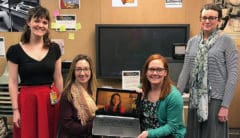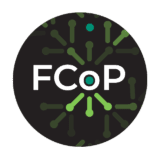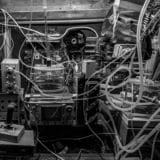Overview
retroTECH, a project supported by the Library at Georgia Tech in Atlanta, engages the campus community in creating the future by exploring and preserving our technological pasts. The retroTECH FCoP project sought to develop an online presence for tech history that is as innovative as its physical spaces.
The FCoP project team aimed to create a proof-of-concept for retroTECH Online, an online emulation environment through which authenticated Georgia Tech students and other researchers can utilize emulated software from retroTECH’s collections for teaching and learning. The project also produced a series of oral history “software stories” that provide cultural and historical context surrounding that software.
The Team

Wendy Hagenmaier: Project Lead, Digital Collections Archivist (left)
Amanda Pellerin: Access Archivist (second from left)
Bing Wang: Assistant Dean (on laptop)
Jody Thompson: Head of Archives and Special Collections (second from right)
Susan Wells Parham: Research Services Librarian (right)
Outcomes
The Georgia Tech team created a wealth of content throughout this project, with the main deliverable being a prototype of retroTECH Online. The project focal point is what the team calls the “software story.” Through collection development and oral history, they examined possibilities for using retroTECH Online to spotlight the people at the heart (or too often, the undocumented peripheries) of Georgia Tech’s technological pasts and futures.
Along with the retroTECH Online prototype, the Georgia Tech team created guidelines and interview protocols for collecting oral histories and working with users, adding to the conversation around software preservation and centering the experiences of the people behind the software.
Insights
- ”Preservation” refers to the preservation of software itself, but it can also include the preservation and presentation of context — descriptions of what the development of the software look like, what the field looked like at the time, and how developers understood their work. Value can be gained from presenting contextual or historical information, like oral histories or “software stories,” side by side with the emulated software itself.
- Developing a culture of long-term thinking requires preservation, connecting different generations, maintaining institutional knowledge, bringing histories into the present, and making content accessible in a sustainable and appropriate way.
- Complexity is the norm. Regardless of how narrow the goals of a preservation project may be, preservation projects usually end up encompassing broad and diverse activities, from staff training to capacity building to new workflows, because of the nature of software preservation.
- Software preservation often means interacting with multiple, siloed systems. Getting a project done requires confronting these silos, and often necessitates finding ways to build metadata and data pipelines along multiple systems as they change and get swapped out over time.
- Starting a new project (like software preservation) often begins with assessing and finding dysfunctions in existing systems and workflows. This can be disruptive and challenging, but it can also help diagnose problems and be useful for prioritizing what to fix.
Reflections

FCoP 2020 Cohort Reflections: Georgia Tech
“I will be graduating with my degree in Computer Science at the end of this year. My junior design project is actually sourced around being able to use technology to connect medical mission trips to areas like Haiti and Vietnam …Continue FCoP 2020 Cohort Reflections: Georgia Tech
Cohort Reflections, News

FCoP 2019 Cohort Reflections: Georgia Tech
retroTECH is a service and a lab space in the Georgia Tech Library. Our mission is to inspire a culture of long-term thinking, hands-on access to technological heritage, and individual agency over personal histories, archives, and data. It’s also a …Continue FCoP 2019 Cohort Reflections: Georgia Tech
Cohort Reflections, News
Workflows

Georgia Tech: Oral History Project Interview Packet (Faculty/Staff/Alumni Donors)
This interview packet contains the following: Purpose statement for the retroTECH Software Preservation Oral History Project Procedures, or “what to expect” when participating in an oral history Overview of the Oral History Agreement or “Deed of Gift” Interview outline and …Continue Georgia Tech: Oral History Project Interview Packet (Faculty/Staff/Alumni Donors)
FCoP, Resources, Workflow Documentation

Georgia Tech: Oral History Project Interview Packet (Student Donors)
This interview packet contains the following: Purpose statement for the retroTECH Software Preservation Oral History Project Procedures, or “what to expect” when participating in an oral history Overview of the Oral History Agreement or “Deed of Gift” Interview outline and …Continue Georgia Tech: Oral History Project Interview Packet (Student Donors)
FCoP, Resources, Workflow Documentation

Georgia Tech: User Testing Draft Plan
This plan outlines the following: Possible user test types Resources and examples of other user tests in archival projects Potential users and the retroTECH Online stakeholder categories that they correspond to Two examples of retroTECH user test designs Possible data …Continue Georgia Tech: User Testing Draft Plan
FCoP, Resources, Workflow Documentation

Georgia Tech: User Stories Spreadsheet
This spreadsheet template was used for collective ideation within the retroTECH team. There are five tabs in the spreadsheet: Guiding Question Stakeholder Roles & Definitions User Stories: Priority, Stakeholder Role, “I want to”, “so that”, Categories, Relationship to other work …Continue Georgia Tech: User Stories Spreadsheet
FCoP, Resources, Workflow Documentation

Georgia Tech: User Stories in Zenhub Snapshot
This image provides a snapshot of user story development and prioritization by the team within the retroTECH Online ZenHub account. Because retroTECH Online was partially a software development effort, it was helpful to apply an agile project management framework towards …Continue Georgia Tech: User Stories in Zenhub Snapshot
FCoP, Resources, Workflow Documentation

Georgia Tech: Review of the ARL Code of Best Practices
This matrix corresponds to the ARL Code of Best Practices for Software Preservation and the Software Stories that were developed as part of retroTECH Online. The “Situations” listed in the matrix correspond to the five situations or scenarios in the …Continue Georgia Tech: Review of the ARL Code of Best Practices
FCoP, Resources, Workflow Documentation

Georgia Tech: Software Emulation Inclusion Criteria Checklist
This checklist to help the project team identify which pieces of software they want to include in their pilot project.
FCoP, Resources, Workflow Documentation
Code
The retroTech Online prototype represented the main deliverable for Georgia Tech’s project. While we encourage people to visit the live site (https://www.library.gatech.edu/retrotech-online) where the prototype has been deployed, others might find it useful to see the software code (hosted on Github) used to create the web application at the heart of the prototype. Using the Laravel PHP framework, this application integrates data and assets from external systems (ArchivesSpace, DSpace) to provide an online space where visitors can experience Georgia Tech’s multi-faceted “software stories.”
retroTech Online code repository: https://github.com/retroTECHOnlineTeam/retroTechOnline
retroTECH Online System Diagram: https://github.com/retroTECHOnlineTeam/retroTechOnline/blob/master/resources/assets/RetroTechOnlineSystemDiagram.png
Software Stories
Interactive Media Technology Center Olympic System
This software story contains oral histories with Mike Sinclair and Scott Robertson, digitized footage, and documentation related to the Interactive Media Technology Center’s development of a multimedia system that played a significant role in making the case for Atlanta to host the 1996 Olympics.
Technology Opportunity Analysis
This software story contains oral histories with Dr. Alan Porter and Nils Newman related to software supporting the Technology Opportunities Analysis approach developed at Georgia Tech. A current iteration of the software, VantagePoint, is produced by Search Technology, Inc., and is available for use by Georgia Tech students and employees.
Office of Jack Pyburn, Architect, Inc.
This software story explores how architect Jack Pyburn has used technology to support his creative process. Pyburn is an Atlanta-based architect and recipient of numerous awards based on his work in the historic preservation community.
Ribbit
This software story contains an oral history with Dr. Lance Fortnow, as well as access to a game he created in 1982 called Ribbit. Dr. Fortnow was formerly Chair of the School of Computer Science at Georgia Tech.
Media Device Architecture, GT CS2261
This software story contains games and stories from Georgia Tech’s CS2261 course, Media Device Architecture. CS2261 covers knowledge related to controlling the interface between hardware and software in media devices, as well as machine-level programming (e.g., in C) to create graphics, generate sound, and support user interaction. As part of the course, students create games for the Game Boy Advance. This collection includes selections of the games, as well as oral histories with the student game creators. Several of these games are also playable on a vintage Game Boy Advance device in the retroTECH lab.
Computer Organization and Programming, GT CS2110
This software story contains games and stories from Georgia Tech’s CS2110 course, Computer Organization and Programming. CS2110 offers an introduction to basic computer hardware, machine language, assembly language, and C programming. As part of the course, students create games for the Game Boy Advance. This collection includes selections of the games, as well as oral histories with the student game creators. Several of these games are also playable on a vintage Game Boy Advance device in the retroTECH lab.
Conference & Presentations

Georgia Tech: Kickoff Meeting Lightning Talk
Slide deck from the FCoP 2018 Project Kick-off Meeting at the Computer History Museum in Mountain View, California.
Conferences & Presentations, FCoP, Resources
All-Cohort Exercises

Georgia Tech: Scenarios for (Re)Use and Access
This worksheet includes several key sets of work by the retroTECH team: Detailing scenarios for use and access which includes: Types of stakeholders involved in each use case Defining the user’s goals or what they want to so with software …Continue Georgia Tech: Scenarios for (Re)Use and Access
All-Cohort Exercises, FCoP, Resources

Georgia Tech: FCoP Project Plan
This document includes a detailed six month project plan which outlines milestones and intermediate sets of work that the retroTECH team undertook to achieve those milestones.